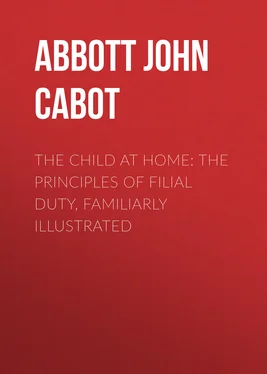John Abbott - The Child at Home - The Principles of Filial Duty, Familiarly Illustrated
Здесь есть возможность читать онлайн «John Abbott - The Child at Home - The Principles of Filial Duty, Familiarly Illustrated» — ознакомительный отрывок электронной книги совершенно бесплатно, а после прочтения отрывка купить полную версию. В некоторых случаях можно слушать аудио, скачать через торрент в формате fb2 и присутствует краткое содержание. Жанр: foreign_prose, foreign_edu, foreign_antique, на английском языке. Описание произведения, (предисловие) а так же отзывы посетителей доступны на портале библиотеки ЛибКат.
- Название:The Child at Home: The Principles of Filial Duty, Familiarly Illustrated
- Автор:
- Жанр:
- Год:неизвестен
- ISBN:нет данных
- Рейтинг книги:4 / 5. Голосов: 1
-
Избранное:Добавить в избранное
- Отзывы:
-
Ваша оценка:
- 80
- 1
- 2
- 3
- 4
- 5
The Child at Home: The Principles of Filial Duty, Familiarly Illustrated: краткое содержание, описание и аннотация
Предлагаем к чтению аннотацию, описание, краткое содержание или предисловие (зависит от того, что написал сам автор книги «The Child at Home: The Principles of Filial Duty, Familiarly Illustrated»). Если вы не нашли необходимую информацию о книге — напишите в комментариях, мы постараемся отыскать её.
The Child at Home: The Principles of Filial Duty, Familiarly Illustrated — читать онлайн ознакомительный отрывок
Ниже представлен текст книги, разбитый по страницам. Система сохранения места последней прочитанной страницы, позволяет с удобством читать онлайн бесплатно книгу «The Child at Home: The Principles of Filial Duty, Familiarly Illustrated», без необходимости каждый раз заново искать на чём Вы остановились. Поставьте закладку, и сможете в любой момент перейти на страницу, на которой закончили чтение.
Интервал:
Закладка:
You see, then, how great are your responsibilities as a child. You have thought, perhaps, that you have no power over your parents, and that you are not accountable for the sorrow which your conduct may cause them. Think you that God will hold this child guiltless for all the sorrow he caused his father and his mother? And think you God will hold any child guiltless, who shall, by his misconduct, make his parents unhappy? No. You must answer to God for every thing you do, which gives your parents pain. And there is no sin greater in the sight of God than that of an ungrateful child, I have shown you, in the two illustrations which you have just read, how much the happiness of your parents depends upon your conduct. Every day you are promoting their joy or their sorrow. And every act of disobedience, or of ingratitude, however trifling it may appear to you, is, in the eyes of your Maker, a sin which cannot pass unnoticed. Do you ask, Why does God consider the ingratitude of children as a sin of peculiar aggravation? I reply, Because you are under peculiar obligation to love and obey your parents. They have loved you when you could not love them. They have taken care of you when you could not reward them. They have passed sleepless nights in listening to your cries, and weary days in watching over you, when you could neither express thanks nor feel grateful. And after they have done all this, is it a small sin for you to disobey them and make them unhappy?
And indeed you can do nothing to make yourself so unhappy as to indulge in disobedience, and to cherish a spirit of ingratitude. You never see such a child happy. Look at him at home, and, instead of being light-hearted and cheerful, he is sullen and morose. He sits down by the fireside in a winter evening, but the evening fireside affords no joy to him. He knows that his parents are grieved at his conduct. He loves nobody, and feels that nobody loves him. There he sits silent and sad, making himself miserable by his own misconduct. The disobedient boy or girl is always unhappy. You know how different the dispositions of children are. Some are always pleasant and obliging, and you love their company. They seem happy when they are with you, and they make you happy. Now you will almost always find, that such children are obedient to their parents. They are happy at home, as well as abroad. God has in almost every case connected enjoyment with duty, and sorrow with sin. But in no case is this connection more intimate, than in the duty which children owe their parents. And to every child who reads this book, I would say, If you wish to be happy, you must be good. Do remember this. Let no temptation induce you for a moment to disobey. The more ardently you love your parents, the more ardently will they love you. But if you are ungrateful and disobedient, childhood will pass away in sorrow; all the virtuous will dislike you, and you will have no friends worth possessing. When you arrive at mature age, and enter upon the active duty of life, you will have acquired those feelings which will deprive you of the affection of your fellow beings, and you will probably go through the world unbeloved and unrespected. Can you be willing so to live?
The following account, written by one who, many years after her mother's death, visited her grave, forcibly describes the feelings which the remembrance of the most trifling act of ingratitude will, under such circumstances, awaken.
"It was thirteen years since my mother's death, when, after a long absence from my native village, I stood beside the sacred mound, beneath which I had seen her buried. Since that mournful period, a great change had come over me. My childish years had passed away, and with them my youthful character. The world was altered too; and as I stood at my mother's grave, I could hardly realize, that I was the same thoughtless, happy creature, whose cheeks she so often kissed in an excess of tenderness. But the varied events of thirteen years had not effaced the remembrance of that mother's smile. It seemed as if I had seen her but yesterday—as the blessed sound of her well- remembered voice was in my ear. The gay dreams of my infancy and childhood were brought back so distinctly to my mind, that, had it not been for one bitter recollection, the tears I shed would have been gentle and refreshing. The circumstance may seem a trifling one, but the thought of it now pains my heart, and I relate it, that those children who have parents to love them may learn to value them as they ought.
"My mother had been ill a long time, and I became so accustomed to her pale face and weak voice, that I was not frightened at them, as children usually are. At first, it is true, I sobbed violently; but when, day after day, I returned from school, and found her the same, I began to believe she would always be spared to me. But they told me she would die.
"One day, when I had lost my place in the class, and had done my work wrong side outward, I came home discouraged and fretful. I went to my mother's chamber. She was paler than usual, but she met me with the same affectionate smile that always welcomed my return. Alas, when I look back through the lapse of thirteen years, I think my heart must have been stone not to have melted by it. She requested me to go down stairs and bring her a glass of water. I pettishly asked why she did not call a domestic to do it. With a look of mild reproach, which I shall never forget, if I live to be a hundred years old, she said, 'And will not my daughter bring a glass of water for her poor sick mother?'
"I went and brought her the water, but I did not do it kindly. Instead of smiling and kissing her, as I was wont to do, I set the glass down very quickly, and left the room. After playing about a short time, I went to bed without bidding my mother good night. But when alone in my room, in darkness and in silence, I remembered how pale she looked, and how her voice trembled when she said, 'Will not my daughter bring a glass of water for her poor sick mother?' I could not, sleep. I stole into her chamber to ask forgiveness. She had sunk into an easy slumber, and they told me I must not waken her. I did not tell any one what troubled me, but stole back to my bed, resolved to rise early in the morning, and tell her how sorry I was for my conduct.
"The sun was shining brightly when I awoke: and, hurrying on my clothes, I hastened to my mother's chamber. She was dead! She never spoke more—never smiled upon me again and when I touched the hand that used to rest upon my head in blessing, it was so cold that it made me start. I bowed down by her side, and sobbed in the bitterness of my heart. I thought then I might wish to die, and be buried with her, and, old as I now am, I would give worlds, were they mine to give, could my mother but have lived to tell me that she forgave my childish ingratitude. But I cannot call her back; and when I stand by her grave, and whenever I think of her manifold kindness, the memory of that reproachful look she gave me will bite like a serpent and sting like an adder."
And when your mother dies, do you not think that you will feel remorse for every unkind word you have uttered, and for every act of ingratitude? Your beloved parents must soon die. You will probably be led into their darkened chamber, to see them pale and helpless on their dying bed. Oh, how will you feel in that solemn hour! All your past life will come to your mind, and you will think that you would give worlds, if you could blot out the remembrance of past ingratitude. You will think that, if your father or mother should only get well, you would never do any thing to grieve them again. But the hour for them to die must come. You may weep as though your heart would break, but it will not recall the past, and it will not delay their death. They must die; and you will probably gaze upon their cold and lifeless countenances in the coffin. You will follow them to the grave, and see them buried for ever from your sight. Oh, how unhappy you will feel, if you then have to reflect upon your misconduct! The tears you will shed over their graves will be the more bitter, because you will feel that, perhaps, your own misconduct hastened their death.
Читать дальшеИнтервал:
Закладка:
Похожие книги на «The Child at Home: The Principles of Filial Duty, Familiarly Illustrated»
Представляем Вашему вниманию похожие книги на «The Child at Home: The Principles of Filial Duty, Familiarly Illustrated» списком для выбора. Мы отобрали схожую по названию и смыслу литературу в надежде предоставить читателям больше вариантов отыскать новые, интересные, ещё непрочитанные произведения.
Обсуждение, отзывы о книге «The Child at Home: The Principles of Filial Duty, Familiarly Illustrated» и просто собственные мнения читателей. Оставьте ваши комментарии, напишите, что Вы думаете о произведении, его смысле или главных героях. Укажите что конкретно понравилось, а что нет, и почему Вы так считаете.












